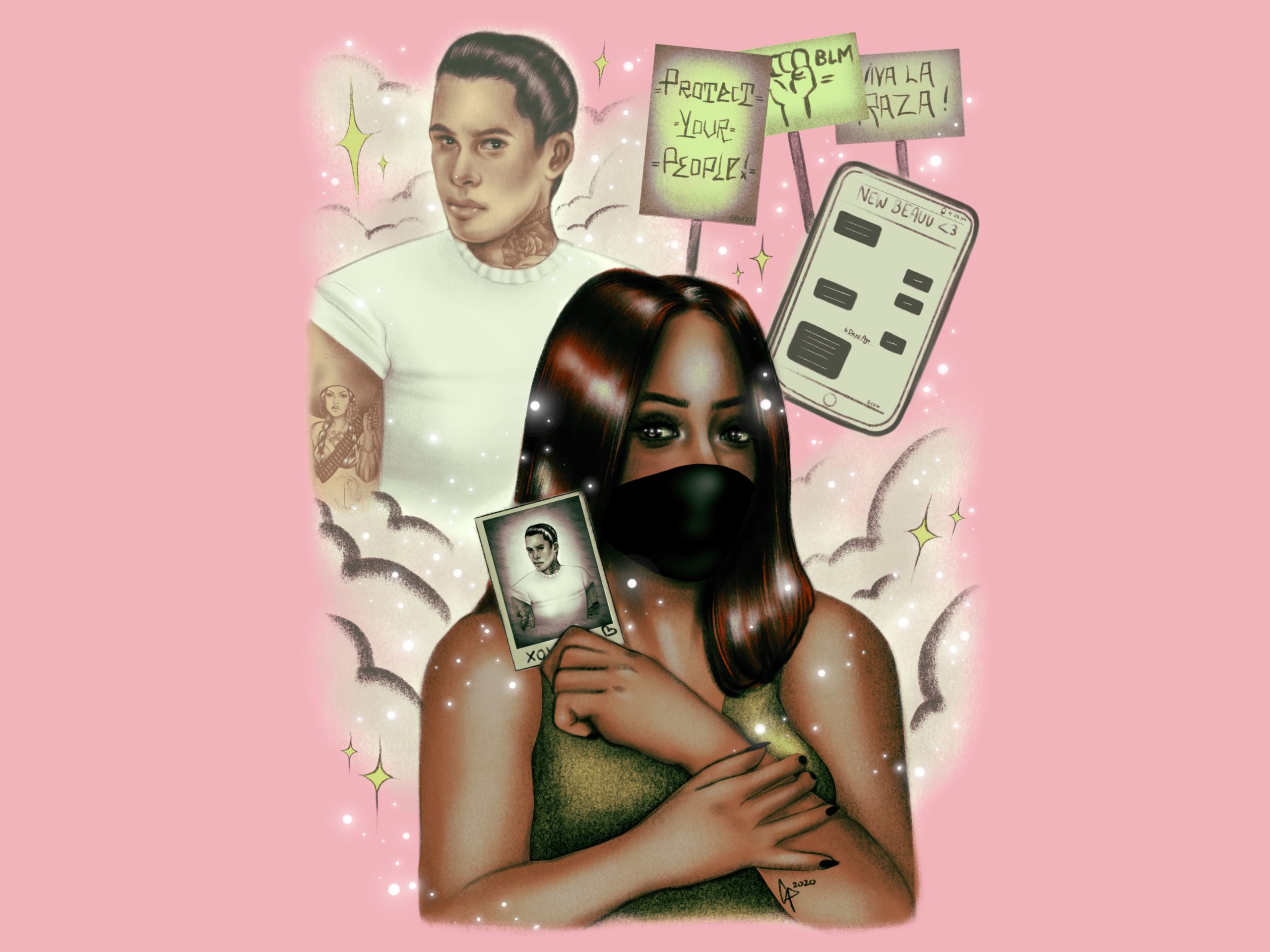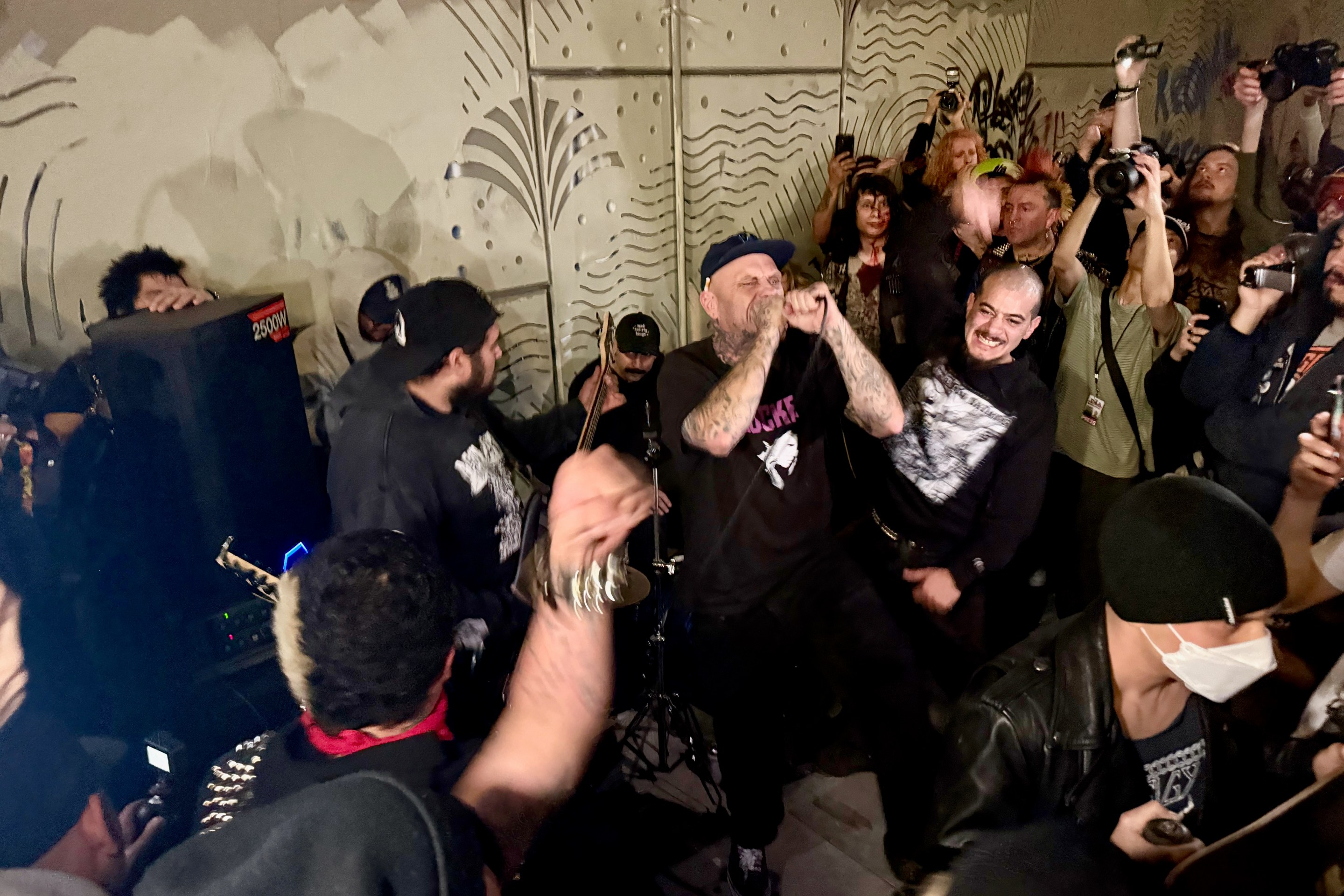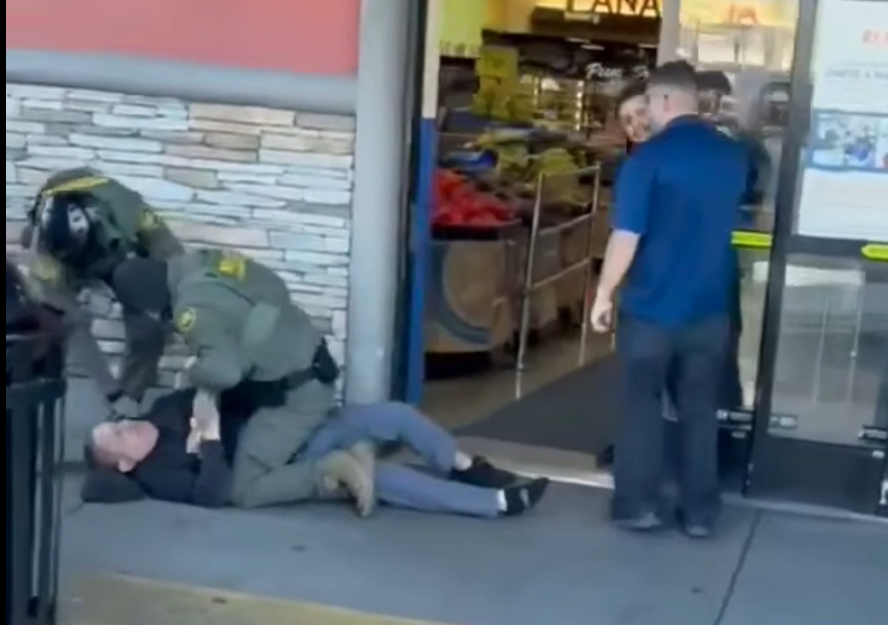[dropcap size=big]H[/dropcap]e had permanent ink on his arms and neck, and charcoal hair combed into a pompadour. He could hurt you with a stare and love you fondly with a single blink.
I felt safe being with him, maybe because he was the opposite of his exterior, perhaps because he was the one who admired me as if he had never seen me before. Maybe because the silence between us always raptured like a bubblegum globe when he said, “You are beautiful.”
We first saw each other in October 2018, and in December, we sat across from each other at a BBQ event. In February 2019, we had our first date on Pacific Avenue in Huntington Park. We were focused on each other rather than the discussions and laughter around us. We spoke about our hobbies and our goals, and not much about our pasts.
A year later, we would meet at a hamburger kitchen for lunch and depart with a hug before we each returned to work. It was the same place where we talked in the parking lot and where he responded to my kisses as it began to rain. It was that parking lot where we first held hands, and our arms and lips embraced each other.
...When he threw in “Mi reyna” or “Te amo,” I swooned.
He was into the kind of music you hear in a record; old school slow jams with heartfelt lyrics about breakups and makeups. White Rabbit by Jefferson Airplane. Who Are You by The Who.
But who was I?
Our second date was at a Mexican restaurant where we both ordered chilaquiles—my favorite! He was born and raised in Northern California, lived in Texas for a while, before moving back to his hometown. He often spoke English with a Spanish word or phrase added for seasoning. This excited me. It was sexy, knowing he was a Mexican American like me. But the English language dominated his vocabulary, so when he threw in “Mi reyna” or “Te amo,” I swooned.
Not many Latinos celebrate the look and style of the 1950s and 1960s. To us, those decades were not all about the rock and roll concerts and fun times. Back then, there were judgments on the way people like us looked and dressed. We were attacked physically and verbally by racists. Unfortunately, this still lingers today.
He was a history enthusiast like me, and our conversations ranged from the Civil War to Ritchie Valens to lowriders. Our shared songs consisted of the Ronettes, the Miracles, Rosie and the Originals, Linda Ronstadt, and Trish Toledo.
He sent me oldies to listen; I sent him oldies to listen.
Making out with him in my car while listening to oldies was a stencil that my lips had traced, and my ears had finally reconsidered. Linda Ronstadt had never sounded so soulful, so rebellious, and so romantic. It was soul, and it was blues, it was rock n’ roll. It was the sound created by our Black brothers and sisters and infused with the love and hope that our Brown people shared with them. The doo-wop and soul sound influenced our music and culture just as it did to many others across the nation.
He sent me oldies to listen; I sent him oldies to listen. He wanted me to be with him. I wanted to be with him. We both heard what each of us was trying to put into words. Besides, a song is more romantic anyway. He reintroduced me to the songs I had heard repeatedly, but I listened with a different ear, a different perspective. “Be My Baby” by the Ronettes became less of a dance song and instead became a wish and a vow we made to each other. “Stand by Me” was both pro-justice and romantic. I heard Ben E. King sing it as an anthem for change and racial equality. I heard King sing it to his future wife, asking for her loyalty even if the world was ending. I heard it both ways.
He never spoke about his past. He asked for my love and support, even if our family forbade our relationship. I stood by him—determined to make our relationship work despite the quarantine and despite what our families might think.
He inspired me to watch movies about our culture and life in America, such as My Family (1995) and Zoot Suit (1981). He reminded me of Chucho in My Family, “One of the baddest Pachucos.” His combed black hair, brown eyes, and skin, dressed in pleated khakis paired with a single-buttoned Pendleton and Converse sneakers. Like Chucho, he got into trouble as an adolescent, but he didn’t talk about it.
The quick meetings we had gave me a thrill and made me feel like a though, bad girl. He always offered to pay and invited me out to car shows and weekend escapades.
In the one and a half months that we dated, we went on lunch breaks and evening dinners. The quick meetings we had gave me a thrill and made me feel like a though, bad girl. He always offered to pay and invited me out to car shows and weekend escapades.
Through the movies I watched on Mexican Americans, I learned more about our culture and past than I did in history lectures. Latinos encountered discrimination for our cinnamon skin, our molcajete hair, and our style of clothing.
I admired his Pachuco con Pachuca t-shirt. The Pachuca’s red lipstick and black eyeliner looked like it was stamped above her eyelashes at birth. It was the same winged liner and red lipstick I wear like an honor to my skin color, a compliment to my culture. The Pachucos were male teens who dressed in baggy pants, oversized and shoulder-padded jackets. This style became popular during the 1940s as a way for men to swing dance more comfortably and accentuate their movements. Chicanos and non-Latino Black men favored the look, but it turned them into a racial target by Whites.
The quarantine gave us a distant glimpse of the segregation that oppressed peoples encountered half a century ago. Our families were separated; we were confined to our homes to escape the dangers and outside people. We couldn’t visit our family that remained in Mexico; we couldn’t hug them, and we couldn’t love them. We walked, spread resources, and signed petitions for racial equality.
All these issues started to get in the way of us. I wasn’t able to see him as I used to various times a week. I wasn’t able to touch his face or his hands as we listened to oldies in my car. We video chatted less, and the few times we did, we argued over loyalty and insecurities when his ex-girlfriend wanted him back. We became inflamed with the irritation and unfamiliarity of self-quarantine.
I lost him, but through our brief relationship, I gained so much knowledge and perspective about my Brown past and joined the current cause for racial equality.
I became occupied with job searches and applications. He became busier at work, rising at dawn and arrived home past 6 PM. I began to think he was lying and spending his evenings and weekends with other women. He repeatedly asked me to visit him or spend time together in a city outside our own, but I denied it. I didn’t want to break the rules of self-quarantine. I didn’t want to risk getting sick or spreading the virus without knowing I could have it.
Was it my self-isolation mind talking, or had I lost interest in him?
He thought it was the latter when he told me to stop playing around because he felt I was no longer eager to spend time with him. He said I was not interested in being in a long-term relationship with him. Was it true? Maybe we both jumped into the idea of being together before the quarantine started because we thought we wanted to love someone. What if the world ended, and we never experienced love with someone who shared the same cultural background, music interests, and love?
The quarantine had separated us physically and romantically. Our video calls and sweet messages stopped. Looking through photos and artwork from previous Mexican American generations and today’s artists has inspired me to embrace my culture. I can celebrate and honor my people—their dreams, their struggles, and their accomplishments. It is the same dreams and struggles hundreds of people of color continue to have today. I lost him, but through our brief relationship, I gained so much knowledge and perspective about my Brown past and joined the current cause for racial equality.
He gave my interest in the ‘50s and ‘60s a different vibe. I heard the songs from his perspective—a rough past, forbidden love, and the hopes of being together either as a couple or as humanity.
Although we broke up, I cherish the moments we spent together talking about the Zoot Suit movie and listening to the oldies that the Pachucos grooved to as they cruised decades ago. The same songs and clothing styles have become part of our parents’ and grandparents’ histories, culture, and America.







